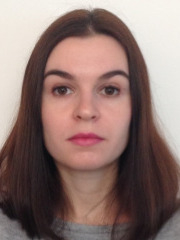Alina Sergeevna Isaeva
+7(863) 436-13-74
Senior researcher
Institute of Nanotechnologies, Electronics and Equipment Engineering

Research interests:
The scope of my research interest is the development of systems for monitoring surface defects. I have studied the possibility of creating automated control systems of cracks, tears and scratches on the surface of the working structures in the mode of operation of technical devices. Currently being developed monitoring system based on the principle of electrical impedance tomography.
Research projects:
Monitoring system based on the principle of electrical impedance tomography
Teaching:
-
Interdisciplinary project "Development of the concept of electronic digital device"
Development of the concept of electronic digital device - training stand. Practical exercises, independent work of students.
-
Design of complex VLSI functional blocks using VHDL
Conducting laboratory works on discipline
-
Design of integrated circuits
The subject of the discipline are the designs of integrated circuits (ICs), structures, operating principles, parameters and characteristics of elements of micro- and nanoelectronics, methods and software tools for designing IC, promising technologies for manufacturing IC. The content of the discipline includes information on designs, design methods and manufacturing techniques for the modern element base of microelectronic equipment: the structure, operation principles, parameters and characteristics of elements of micro- and nanoelectronics, semiconductor and hybrid-film ICs of various levels of integration, including large and extra-large integrated circuits, large hybrid integrated circuits, memory devices and microprocessors, elements and devices of the functional micro- and nanoelectronics; nomenclature, operating conditions and features of the use of unified and specialized ICs.
-
Design of complex VLSI functional blocks using VHDL
Objectives of mastering discipline (module): Study of theoretical foundations and acquisition of practical skills in designing complex VLIC functional blocks at the register transfer level using VHDL; familiarity with the Quartus II design environment of Altera. Tasks: consideration of the prerequisites for the formation and application of high-level languages for the description of equipment; study of the through-route design of fully custom-made integrated circuits (ASICs) using library elements; the study of the through-route of the design of programmable logic integrated circuits using CAD Quartus II from Altera; study of the synthesized subset of VHDL; development of VHDL-descriptions of complex function blocks in the stream, structural and behavioral style; development of skills of independent work with educational methodological and scientific and technical literature, including foreign literature; development of skills of analysis, systematization and presentation of the results of independent work at seminars.
-
Designing electronic components using CAD
The goal is to study the basic physical processes and phenomena of electronic components by students, study the principles of designing, designing, producing and operating microelectronic equipment with high quality indicators. Tasks: the study of theoretical and methodological foundations of modern micro- and nanoelectronics, the basic physical processes of electronics, methods and principles of designing electronic components.
-
Methods of mathematical modeling
Objectives of mastering the discipline (module): Studying theoretical information about methods and means of numerical solution of equations of mathematical physics; the acquisition by students of practical skills necessary for the development of algorithms and software for the numerical solution of equations of mathematical physics. Problems: the study of the basic equations of mathematical physics; The study of boundary and initial conditions in problems of mathematical physics; the study of the method of finite differences; the study of the finite element method; the study of direct and iterative methods for solving systems of linear algebraic equations; studying methods for solving systems of nonlinear algebraic equations; learning the basics of programming in the MATLAB / OCTAVE environment; acquiring the practical skills of creating your own software for the numerical solution of partial differential equations; studying the classification of mathematical models of elements of micro- and nanoelectronics; study of the fundamental system of semiconductor equations in the diffusion-drift approximation; the study of boundary and initial conditions for a fundamental system of equations; normalization of the fundamental system of equations; the study of the bases of variables used in the process of numerical solution of the fundamental system of equations; the study of methods for the numerical solution of the fundamental system of semiconductor equations in the diffusion-drift approximation; study of the Schrödinger equation; the study of the initial and boundary conditions for the Schrödinger equation; normalization of the Schrödinger equation; a model study of the eigenvalues of the energy and wave functions of charge carriers in nanostructures; the study of the method of self-consistent numerical solution of the Schrödinger and Poisson equations; numerical solution of the nonstationary Schrödinger equation. During the training, students develop self-learning skills in numerical modeling methods, organizing research and design work, communicating with colleagues in the scientific and social-public spheres of activity. Students acquire the ability to solve research problems, implement the formulation of problems of mathematical physics.
-
"Interdisciplinary project "Information Technologies for Design of Electronic components""
Studying the principles of designing, designing, producing and operating microelectronic equipment with high quality indicators, as well as studying modern CAD systems for developing and working with electronic equipments. Students study modern methods of prototyping electronic equipments.
-
Interdisciplinary project "Methods of mathematical physics in the modeling of electronic means"
Analysis of structures and principles of functioning of micromechanical elements of modern devices. Development of models, the study of theoretical foundations and the acquisition of practical experience in the numerical simulation of micromechanical devices.



